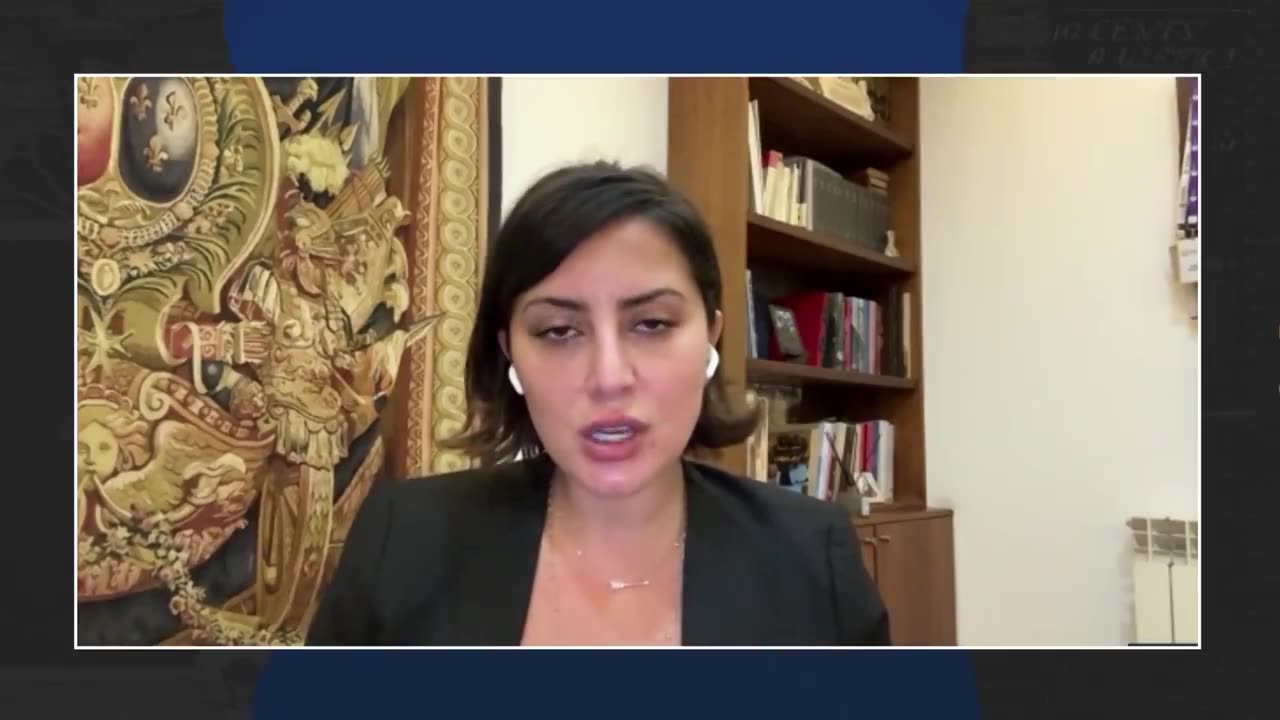Premium Only Content

Ghadi Francis & George Galloway
https://x.com/ghadifrancis/status/1821877538148278324
I would agree, first of all, I want to salute you, George, for all the activism and the work you've been doing. Thank you. You always resonate with our most important issues, and throughout this genocide, you've been a global voice, and I must send you all the love and appreciation from everyone around me here. Thank you. I want to tell you that, yes, it is a lot likely. But the thing, the twist here in the narrative is that it's not new in our lives. And I personally am not more precious than anybody who has already been massacred, than these flames that have become, unfortunately, normal to the world in Gaza, in southern Lebanon. I've seen my people bombed and killed and massacred year after year after year. I don't even have that mindset that I would be more important, or even my family members. God protect everyone, and God bless every Lebanese, Palestinian, Syrian, Yemeni, Iraqi, because all of these nations are under the attack, and they've been under the attack even before October 7th. So in general, we've been trained enough and traumatized enough to not look at it in the same way that when the Western media is covering it, would really look at it, even though most of the headlines, most of the news, the global news are talking about, okay, chaos, people are afraid, people are running to the airports, flights are being canceled on the ground in Lebanon, believe it or not, George. Most of the people, yes, do have anxiety about it, yes, are worried, but we have been trained to live through that. I'm speaking today, like yesterday, it was the fourth anniversary of the Beirut port blast. I mean, these people have been traumatized enough, and they've seen wars enough, but they are actually way more ready than the Israelis. I just wrote some notes while I listened to what you had to say, and I do want to say that the little that they have, you spoke about the little that they have, the absence of the resistance, the little that they have also means the little that they have to lose, and the lots that the Israelis or the Americans have means also a lot to lose. If we want to break it down into money, the rockets that attack the Israeli tanks, the handmade Al Yassin rockets, cost maybe less than 5% of these tanks that are being destroyed. Yes, we are in pain. Yes, we have been massacred. Yes, we have been witnessing a televised genocide. I don't even have the stomach to fiddle, looking at the mother and that thing you described. We cannot even look at it. We are traumatized people. It is not normal. What has become normal is not normal. I refuse to make it normal. But still, even as we witness all that, this $200, $300, $1,000 worth rocket is stopping the world trade in Yemen. It is actually destroying million-dollar tanks in Gaza, as we speak today, after 300-plus days of war. And in Lebanon, every night as we sleep, on our anxiety, the resistance does its drone magic, very clean kind of way, not to jeopardize our security by not attacking any civilian or settler. On the contrary, they have attacked a soldier and an army commander last night. I was speaking about last night, the drone attack, the Hezbollah drone attack over the Northern Occupied Palestine. So, in general, as the front line is burning, as the headlines are in flames all across the world, I personally do not feel that wave as huge and intense as possible, because it is our war. It's not new. It has been going on for 76 years, although now it's more trendy to talk about. But there's not one day in this precious land that blood hasn't been spilt or people haven't been persecuted, oppressed. So it's our battle here. You know, George, and you know it very well. You've been here, and you know it just like we do. You're right, of course. The $100 million fighter dropping a million-dollar bomb on a $100 tent and massacring a child inside it. The resistance in Gaza has only its handmade weapons and the courage of its fighters, young fighters. The Yemenis, the poorest country in the world, have indeed stopped Israeli shipping traffic, have bankrupted the Israeli port of Eilat. The better armed and far more numerous Lebanese resistance are able and have kept up a constant pressure on the north of Occupied Palestine. But tonight or tomorrow, the big guns arrive. Iran is a very powerful country, a world leader in war materiel, as it has had to be, beleaguered and surrounded by enemies on all sides. And it seems to me likely, because they have waited several days now to make the response that the supreme leader of Iran himself has promised, that that response is going to be a very significant one. And that will propel us into, qualitatively speaking, a new era. This will be the first time, I think, that Iran will, with all guns blazing, join the battle. You agree? I do agree, absolutely, George. It's just like, with one insight here that may people maybe understand how I'm analysing tonight with you. The Iranians have been really creative in their ways of retaliation throughout the past few years. We've been watching them, whether it's in the maritime fights, or on the ground, or in the drones, or in the rockets. They've done some retaliations and they've been hit in many places. I mean, in this war, in the most recent attack on the Iranian embassy in Damascus, they also were confronted, although the measures were different, but they still counted. The thing is, I think that the Iranians do not carry the dictionary that the world has presented to warfare. They make their own dictionary. So what is really new and unprecedented in terms of the strike, of the anticipated strike that Iran will carry on, might be something we don't really know or expect. Because I'm trying to think of precedents here to understand how the Iranians are thinking about this. When I look at the assassination of Qassem Soleimani, they did not say that they will kill someone or assassinate someone. I remember very well that what we understood from the speeches of Sayyid Nasrallah, Sayyid Khamenei, of the IRGC, that Americans will exit Iraq on that blood. And today, years after that, when I look at what's happening in Iraq, and the US troops every now and then taking a step back, I see maybe the retaliation of the Islamic Republic of Iran on that strike was a long process, but really hit hard. So the patience and the diplomacy, the Iranian diplomacy, doesn't resemble anyone else but Iran. And this is why, as you described it, it is a world leader, because it doesn't read by anybody else's book. I mean, unfortunately, Europe today reads in the American book, and many of the nations in Arabia do read in the American book. The Iranians read in their own Persian book. So we are all witnessing a historical moment where we will learn a new word in the Iranian warfare dictionary, I suppose. Brilliantly expressed, and memorably, too. The situation may, of course, be completely unprecedented. There is speculation here, for example, that the resistance in Lebanon and the armed forces and their allies in Syria may seek to recover the Golan Heights stolen from them so many decades ago, 1967. There is the possibility of a ground incursion by the Lebanese resistance into liberating parts of the Galilee. There is the possibility that new ballistic technology that wasn't shown last time out will be used. And perhaps in profusion, there is speculation that Iran will fire 1,500 ballistic missiles at the same time, which will overwhelm any so-called iron domes, any puny efforts by allies and the Israelis to defend themselves against it. In other words, it could be something, if you like, left field, that we're not expecting. Nothing like the response last time out when Iran bombed the apartheid state. Is that possible? Well, I can't help, as you narrate all these scenarios, I can't help but feel so proud on behalf of my ancestors and my parents. I'm so proud that there is the possibility. We are speaking and witnessing a possibility. Mr. George Galloway is telling me we might liberate Golan Heights. We might liberate Galilee. We might liberate this. Just the possibility of that, the reality that we are talking about that, is such a win for our countries and our peoples, George. It's such a big thing. We can come again. We're thinking about land that was taken from us in 1967. Generations later, this has become a possibility. So all these are possibilities, and even some things maybe that we haven't spoken or thought of. The brilliance of the actions of the resistance is that we don't know what to expect from them. Why? We don't know exactly what to expect from the Israeli failure of an occupation state. They can only massacre children and burn dents. What have they done? Did they eradicate Hamas? No. They killed the top negotiator, the political person who is obvious, who is not in the battlefield. He's a politician. So it's not a win as well. They killed Fuad Shukr in the Dahi, not on the battlefield as well, in the Beirut suburb, on a personal place, not in a work or on duty. So in general, these possibilities are all very realistic. And if we think about the years that have, I remember, I mean, I was with you on your show when the safe reports was on and we were talking about how Israel has started its self-destruction path. The war with Israel is not new. The war is as old as the occupation. And in the past decade, in the past decade in particular, after the Syrian war, the Golan Heights have been really boiling with resistance. And I speak today and I really cannot forget Jihad Ahmad Mouhni that was martyred in Golan, on the road to Golan in Syria, and the many, many fighters that, the many, many fighters that were killed in Syria around the Golan Heights, whether they're Iranians or Lebanese in the past years. So it's not very unlikely, but we still, I cannot really confirm anything. No, of course. I saw the ruins of Quneitra, the destruction wrought by the apartheid state in the seizure of the Golan Heights. And I have never, ever forgotten it. That was in 1980, 44 years ago, I visited that place. And it's in my eyes right now. Just lastly, Gadi, the allies in the past of Israel in the Arab camp, we've talked about the camp of resistance. There is a camp of enablers and not just Arab countries, there are other Muslim countries, big ones that have helped to enable Israel over many years, but they are, they are making plain now, Sisi today, the Jordanian foreign minister yesterday, they are trying to make clear to Iran that they are not Israel's handmaidens. We'll see when whatever's going to happen does happen, what role they play, but it is also significant, isn't it, that they can feel no courage in going into bat for Netanyahu? Well, it's also something else if you look at it in another way, George. I mean, we are witnessing the change of the rules in the region, Egypt and Jordan going to Iran. Whether it's to mediate or to send a message or to get some security, I don't know, assurances, regardless of the thing, they need to talk to Iran. Through years and years of hegemony, what did the United States of America really accomplish in West Asia? It made Egypt go to Iran. This is also something to look at. I think this camp of enablers, like you named them, they have zero courage. They have already sold their souls to the devil decades ago as regimes. They also stayed where they were because they sold their souls to the devil. I think they feel everything. And if they had any courage, they wouldn't be where they were. They sold their dignity. And in return, they didn't even get any economic wins. I mean, had they really gotten a bargain out of it, I would have had a little inch of respect for both regimes, but they got nothing. Their peoples are impoverished and their security is like never okay. They can always be bullied around by other regimes. Like Saudi Arabia is more influential than both and can really alter policies inside both these countries. So in general, I think they're trying to save face. Maybe the things they say in the press conference are not the things that they would say inside the meetings. In general, they really might be trying to save themselves, but they're not really playing a zero part. They are with the Israelis. The Jordanians last time did intercept the Iranian domes, and we all know that. The Egyptians are part of the siege on Gaza, and we all know that. And even if they were bullied into that siege, why are they enabling all the theft at the Rafah borders? Sometimes people are paying tens of thousands of dollars to be able to exit by driving Egyptian soldiers on the border. So they're not really doing any security there. They're just doing persecution and aiding the criminals. So in general, I don't have any respect to both regimes to listen to what they have to say. And probably they come to beg to be aside when the Iranian anger emerges in West Asia.
-
 1:42:21
1:42:21
The Quartering
16 hours agoTrump To INVADE Mexico, Take Back Panama Canal Too! NYC Human Torch & Matt Gaetz Report Drops!
166K110 -
 2:23:15
2:23:15
Nerdrotic
16 hours ago $13.78 earnedA Very Merry Christmas | FNT Square Up - Nerdrotic Nooner 453
125K12 -
 1:14:05
1:14:05
Tucker Carlson
16 hours ago“I’ll Win With or Without You,” Teamsters Union President Reveals Kamala Harris’s Famous Last Words
224K377 -
 1:58:31
1:58:31
The Dilley Show
16 hours ago $36.14 earnedTrump Conquering Western Hemisphere? w/Author Brenden Dilley 12/23/2024
166K50 -
 1:09:59
1:09:59
Geeks + Gamers
17 hours agoSonic 3 DESTROYS Mufasa And Disney, Naughty Dog Actress SLAMS Gamers Over Intergalactic
113K21 -
 51:59
51:59
The Dan Bongino Show
18 hours agoDemocrat Donor Admits The Scary Truth (Ep. 2393) - 12/23/2024
931K3.1K -
 2:32:15
2:32:15
Matt Kohrs
1 day agoRumble CEO Chris Pavlovski Talks $775M Tether Partnership || The MK Show
143K36 -
 28:23
28:23
Dave Portnoy
1 day agoDavey Day Trader Presented by Kraken - December 23, 2024
173K44 -
 59:29
59:29
BonginoReport
20 hours agoTrump, Murder Plots, and the Christmas Miracle: Evita + Jack Posobiec (Ep.110) - 12/23/2024
175K152 -
 2:59:14
2:59:14
Wendy Bell Radio
22 hours agoNothing To See Here
137K80